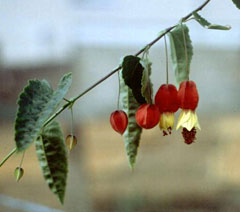 |
|
(c) ken Fern, Plants For A Future 2010 |
 |
|
Translate this page:
Summary
A medium size evergreen shrub growing to 2m. A lax plant, with arching branches, large red calyces and small yellow lantern blooms. It can be trained over arches or as a weeping standard. There are two forms of this species, one prostrate, making a good ground cover the other upright.Flowers are used as a vegetable and have a pleasant sweet flavour, we find them delicious to eat raw.
Physical Characteristics

 Abutilon is an evergreen Shrub growing to 2 m (6ft) by 2 m (6ft) at a fast rate.
Abutilon is an evergreen Shrub growing to 2 m (6ft) by 2 m (6ft) at a fast rate.
See above for USDA hardiness. It is hardy to UK zone 8. It is in leaf all year, in flower from April to September. The species is hermaphrodite (has both male and female organs).
Suitable for: light (sandy), medium (loamy) and heavy (clay) soils. Suitable pH: mildly acid, neutral and basic (mildly alkaline) soils. It can grow in semi-shade (light woodland) or no shade. It prefers moist soil.
UK Hardiness Map
US Hardiness Map
Synonyms
A. vexillarium.
Plant Habitats
Edible Uses
Flowers - cooked. Used as a vegetable[183]. A pleasant sweet flavour, we find them delicious to eat raw[K]. The flowers are produced from mid spring until the autumn - they produce nectar all the time they are open so, assuming the plant is grown indoors and is not visited by pollinating insects, the sweetness increases the longer the flower is open[K].
References More on Edible Uses
| Composition
|
| Figures in grams (g) or miligrams (mg) per 100g of food.
|
|
|
Seed (Fresh weight)
|
|
- 0 Calories per 100g
- Water : 0%
- Protein: 17.4g; Fat: 16g; Carbohydrate: 33.8g; Fibre: 0g; Ash: 4.4g;
- Minerals - Calcium: 0mg; Phosphorus: 0mg; Iron: 0mg; Magnesium: 0mg; Sodium: 0mg; Potassium: 0mg; Zinc: 0mg;
- Vitamins - A: 0mg; Thiamine (B1): 0mg; Riboflavin (B2): 0mg; Niacin: 0mg; B6: 0mg; C: 0mg;
- Reference: [ ]
- Notes:
|
|
Medicinal Uses
Plants For A Future can not take any responsibility for any adverse effects from the use of plants. Always seek advice from a professional before using a plant medicinally.
None known
References More on Medicinal Uses
The Bookshop: Edible Plant Books
Our Latest books on Perennial Plants For Food Forests and Permaculture Gardens in paperback or digital formats.

Edible Tropical Plants
Food Forest Plants for Hotter Conditions: 250+ Plants For Tropical Food Forests & Permaculture Gardens.
More

Edible Temperate Plants
Plants for Your Food Forest: 500 Plants for Temperate Food Forests & Permaculture Gardens.
More

More Books
PFAF have eight books available in paperback and digital formats. Browse the shop for more information.
Shop Now
Other Uses
References More on Other Uses
Cultivation details
Requires a sunny position or part day shade in a fertile well-drained soil[200]. Dislikes drought[200]. This species is only hardy in the mildest areas of Britain, tolerating temperatures down to between -5 to -10°c when given the protection of a south or south-west facing wall[11, 184, 200]. A deep mulch in winter and tying in growth to the wall will maximise protection in winter[200]. If the plant is cut back by cold weather, it will normally resprout from the base in the spring and can flower on the current year's growth[202]. Dead-heading plants to prevent seeding can enhance longevity[200]. Tip-prune young plants to promote a bushy habit, older plants can be cut back hard annually in spring if required[200]. There are some named forms, selected for their ornamental value[200]. There is a variegated form in cultivation, this variegation is as a result of infection by abutilon mosaic virus[184, 200]. Plants in this genus are notably resistant to honey fungus[200].
References Carbon Farming Information and Carbon Sequestration Information
Temperature Converter
Type a value in the Celsius field to convert the value to Fahrenheit:
Fahrenheit:
The PFAF Bookshop
Plants For A Future have a number of books available in paperback and digital form. Book titles include Edible Plants, Edible Perennials, Edible Trees,Edible Shrubs, Woodland Gardening, and Temperate Food Forest Plants. Our new book is Food Forest Plants For Hotter Conditions (Tropical and Sub-Tropical).
Shop Now
Plant Propagation
Seed - sow spring in a greenhouse[200]. Germination should take place within a few weeks. Once the seedlings are large enough to handle, prick them out into individual pots. Grow them on for at least the first winter in a greenhouse and plant out in late spring or early summer, after the last expected frosts. Cuttings of young shoots, June in a frame[200]. Grow on in the greenhouse for their first winter and plant out in spring after the last expected frosts. Cuttings of half-ripe wood, July/August in a frame[200]. Grow on in the greenhouse for their first winter and plant out in spring after the last expected frosts.
Other Names
If available other names are mentioned here
Bencao-de-deus, Brazilian lantern flower, Sininho,
Native Range
Coming Soon
Weed Potential
Right plant wrong place. We are currently updating this section.
Please note that a plant may be invasive in one area but may not in your area so it's worth checking.
Conservation Status
IUCN Red List of Threatened Plants Status :

Growth: S = slow M = medium F = fast. Soil: L = light (sandy) M = medium H = heavy (clay). pH: A = acid N = neutral B = basic (alkaline). Shade: F = full shade S = semi-shade N = no shade. Moisture: D = dry M = Moist We = wet Wa = water.
Now available:
Food Forest Plants for Mediterranean Conditions
350+ Perennial Plants For Mediterranean and Drier Food Forests and Permaculture Gardens.
[Paperback and eBook]
This is the third in Plants For A Future's series of plant guides for food forests tailored to
specific climate zones. Following volumes on temperate and tropical ecosystems, this book focuses
on species suited to Mediterranean conditions—regions with hot, dry summers and cool, wet winters,
often facing the added challenge of climate change.
Read More
Expert comment
Author
(Spreng.)A.St.-Hil.&Naudin.
Botanical References
11200
Links / References
For a list of references used on this page please go here
Readers comment
| Add a comment |
|
If you have important information about this plant that may help other users please add a comment or link below. Only comments or links that are felt to be directly relevant to a plant will be included. If you think a comment/link or information contained on this page is inaccurate or misleading we would welcome your feedback at [email protected]. If you have questions about a plant please use the Forum on this website as we do not have the resources to answer questions ourselves.
* Please note: the comments by website users are not necessarily those held by PFAF and may give misleading or inaccurate information.
To leave a comment please Register or login here All comments need to be approved so will not appear immediately.
|
|